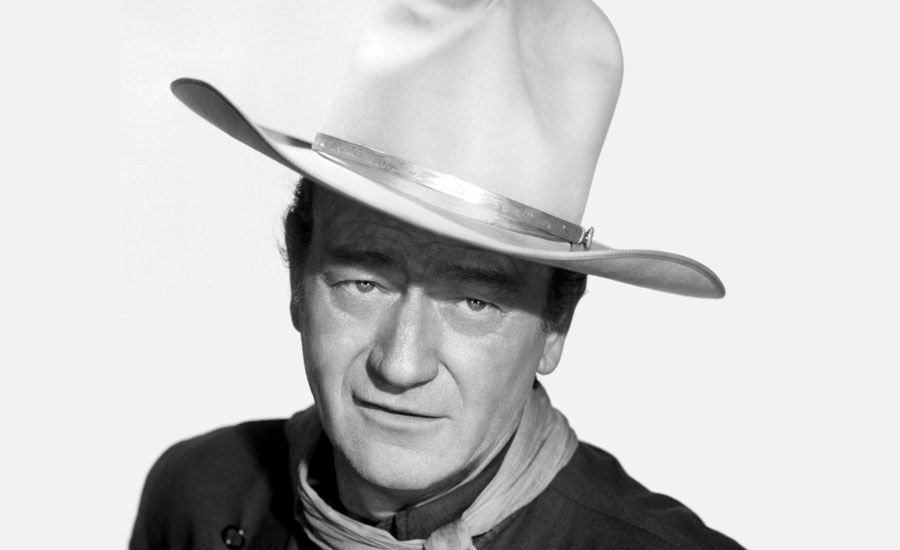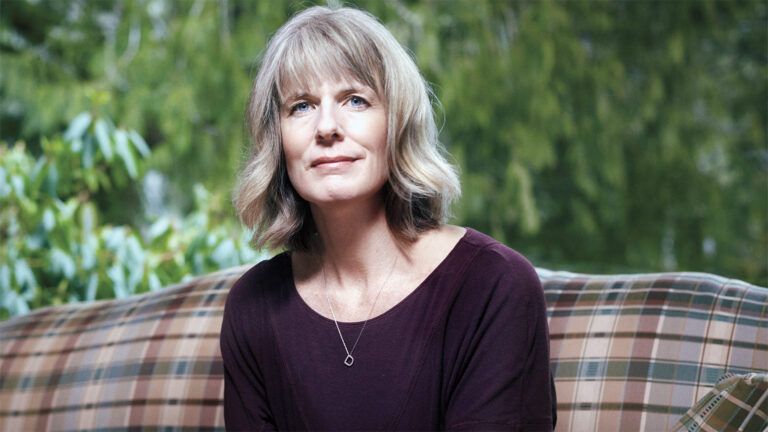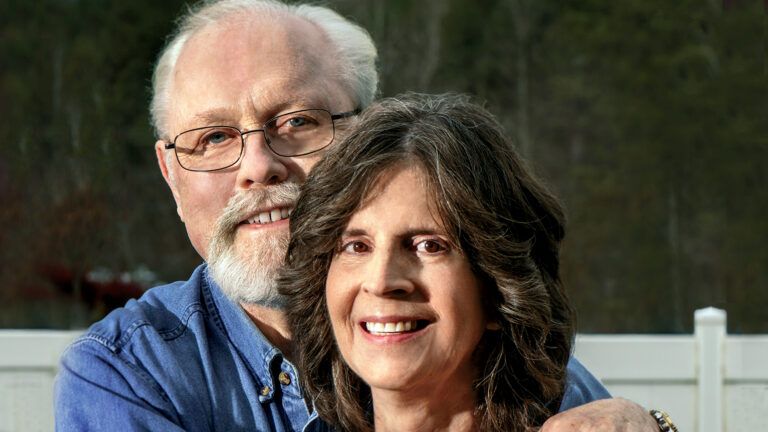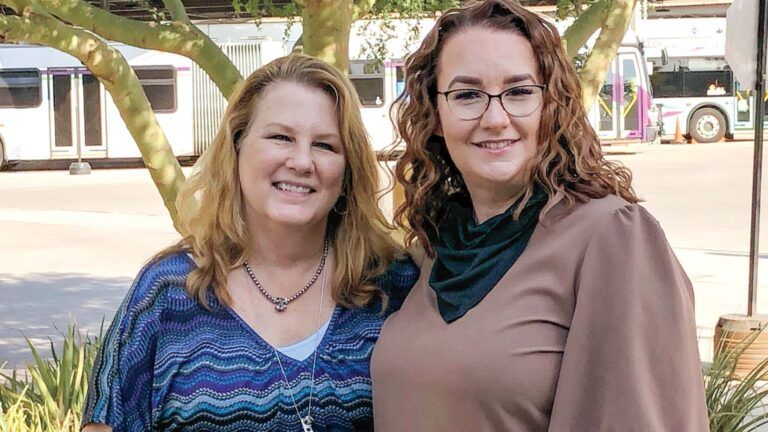Long before I ever made the movie True Grit, people would talk about my screen characters in terms of courage, firmness, stamina–true grit. But what about the man who played those characters?
Certainly I have never thought of myself as a timid type. Even as a child I know I had a certain brashness. I remember two incidents in particular when I was a little boy and my family was homesteading in the Mojave Desert.
The four of us–my mother, father, younger brother and I–had come from a little town in Iowa where dad had been a pharmacist, but because of his health the doctors had told him he should move west.
At first he had thought about going to Montana, but my grandfather wrote and said, “Why not come to California and starve?” We did both.
Dad found some isolated land in Antelope Valley, not close to anything, yet not too far from Lancaster. He built a house for us which was hardly more than a shack and he tried to grow corn on the land as though we were back in Iowa, which clearly we were not.
We had a pretty desperate time of it. I was hardly aware of it, because I was happy–especially, I recall, because I had my own horse which I took care of and rode back and forth to school. Her name was Jenny, and I loved her.
One Halloween night out there in the desert, my brother Bob and I had just come to the table when my mom brought out a bowl full of weenies, a special treat since we didn’t have meat very often. Just at that moment we all heard an eerie sound.
“Who-o-o-o. Who-o-o-o-o.”
It was my dad standing outside the screen door with a sheet over his head, but I thought it was the bogey man. I grabbed the bowl of weenies and flung it at the apparition. It broke up dad’s performance.
As I look back, hurling that bowl of weenies at the bogey man came as natural to me as a knee jerk. Not too long after that, though, I was asked to do something that required a different kind of courage.
My horse Jenny began to get so thin that people in town accused me of not feeding her. Finally the vet told us that for her own good we should destroy her–which was like destroying me. I didn’t want to do it, but it had to be done. So it was done.
Those things were way back in my childhood, but years later, in the fall of 1964, I came face to face with a different kind of demand: the Big C.
In October I’d gone down to the Scripps Clinic in La Jolla for my very belated yearly checkup. I knew I’d been coughing a lot more, but I wasn’t in any kind of pain.
The doctors kept taking X-rays, and I was getting impatient. When they sent me back for the fourth set of pictures, I said to the X-ray doctor, “What’s the deal?”
“Well, it’s positive, of course, but beyond–”
“Wait a minute. Positive? What are you telling me?”
“I’m sorry,” the doctor said, “didn’t you know?”
When I left the clinic that day, I realized I must have a lung operation as fast as possible and that there were a lot of arrangements to make, but for the moment I was dazed.
I’d promised Senator Goldwater, who was running for President then, that I would appear at a rally in San Diego, and I headed there. I sat in the back of the audience instead of on the dais. I don’t know why. I wasn’t trying to escape attention; I think I just wanted to be close to people.
Before the end of the rally, they had hauled me up on the stage and the crowd cheered and I remember thinking how odd it would be if they knew what was happening in my head, that I was standing there a bewildered man in the first flush of fear.
I’m a big man physically and I was lucky to have been born with an unusual amount of strength and stamina. All my life I’ve been grateful for those physical gifts. They shaped my career.
They made it possible for me to play football for the Southern Cal Trojans, which led directly to my getting a summer job as a prop man with a movie studio; and a bit of muscle wasn’t exactly a hindrance for the rest of my career in pictures either.
But any dim-witted thug knows that physical strength is not the same as courage. And that night in San Diego, I needed courage.
Obviously there was no bludgeoning one’s way out of this one; there was nothing to hurl at the bogey man. My very helplessness gave me awful twinges of fear.
Mark Twain wasn’t being humorous when he wrote that, “Courage is resistance to fear, mastery of fear–not absence of fear.” If I was going to do battle with cancer bravely, I knew what it was that I had to conquer first.
In this struggle I had a lot of allies–my family and friends, of course. And prayer. I did a lot of praying in those few shaky days before the operation, and this I know: There is a Man Upstairs holding all this world together, including you and me.
You cannot believe this, and believe it firmly, without drawing the strength, the courage, to master your fears.
The operation was successful, thank God. They cut away a lung, but they left me alive and grateful, and ready to learn something more about adversity.
Overcoming trouble can be like skidding in a car on a slippery road. There’s the first skid which, if you can control it, you feel pretty relieved about. But there is an after-skid waiting to surprise you from the other direction. My after-skid was getting back in harness again.
With all that vaunted energy of mine, I was surprised at how much the operation had slowed me up. I began to think about it, and worry.
My conscience hurt me because I had been scheduled to make a picture with Dean Martin called The Sons of Katie Elder. Everybody had been most considerate about the postponement, but now time was wasting, careers were being interfered with, money was going down the drain.
Finally I made up my mind to do the picture but I had misgivings about myself, about my strength. Those reservations were taken care of by that tremendous old director, Henry Hathaway.
Hathaway had directed me in a number of films, and luckily he had the assignment on Katie Elder. It was he, really, who got me going again, though not with tender loving care. That man was merciless.
The film was shot on location in Durango, Mexico, which is 8000 feet above sea level, not the best place for breathing even with two lungs. It didn’t take me long to figure out what Hathaway was up to. He was being deliberately tough on me.
He had me getting soaked in the river, jumping out of rigs handcuffed, always testing me. I was determined not to let him get the best of me.
One evening we had a night shot in which I was supposed to come riding down a street on a horse carrying a rocking chair in one hand, a Bible in the other and a basket over one arm. I was supposed to stop, dismount and walk into a girl’s domicile.
The horse I was riding had never worked at night before and he was fractious and hard to handle. I kept doing the scene over and over, mounting, dismounting and mounting again with all those encumbrances.
Hathaway watched me carefully, but no more carefully than I was watching myself, for I was getting tired. At last when he finally called out, “Print it! Let’s go to bed,” I knew for sure that not only had I beaten Hathaway at his game, but that I had also won my fight with cancer.
Why had Hathaway chosen to take such a rough tack with me? Why did I let him? Because more than ten years before, he had undergone an operation for cancer far worse than mine.
He knew me well. He knew just how far he could push me and he used the courage he had shown in his own recovery to help bring about mine. Nowadays it’s one of the rewards for me that I am able to tell people that simply because they have cancer doesn’t mean they’re at the end of the road.
It is good and it is helpful to have physical strength; but looking back, I am certain that the truest part of true grit is not physical–it’s moral.
It’s something really tough, something we all fail at from time to time. It’s making a decision and standing firm in it, whether it’s submitting to an operation or putting an ailing pet to sleep. It’s doing what must be done.
After all, if you think about it, that’s the root of all morality, for no moral man can have peace of mind if he leaves undone what he knows he should have done.
Did you enjoy this story? Subscribe to Guideposts magazine.




